
Developmental psychology is the scientific study of how and why humans grow, change, and adapt across the course of their lives. Originally concerned with infants and children, the field has expanded to include adolescence, adult development, aging, and the entire lifespan. Developmental psychologists aim to explain how thinking, feeling, and behaviors change throughout life. This field examines change across three major dimensions, which are physical development, cognitive development, and social emotional development. Within these three dimensions are a broad range of topics including motor skills, executive functions, moral understanding, language acquisition, social change, personality, emotional development, self-concept, and identity formation.

Parenting or child rearing promotes and supports the physical, emotional, social, spiritual and cognitive development of a child from infancy to adulthood. Parenting refers to the intricacies of raising a child and not exclusively for a biological relationship.
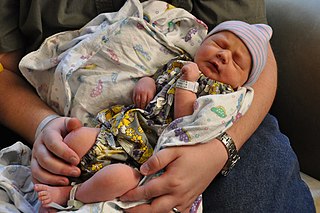
An infant or baby is the very young offspring of human beings. Infant is a formal or specialised synonym for the common term baby. The terms may also be used to refer to juveniles of other organisms. A newborn is, in colloquial use, an infant who is only hours, days, or up to one month old. In medical contexts, a newborn or neonate is an infant in the first 28 days after birth; the term applies to premature, full term, and postmature infants.
A toddler is a child approximately 1 to 3 years old, though definitions vary. The toddler years are a time of great cognitive, emotional and social development. The word is derived from "to toddle", which means to walk unsteadily, like a child of this age.

Baby sign language is the use of manual signing allowing infants and toddlers to communicate emotions, desires, and objects prior to spoken language development. With guidance and encouragement, signing develops from a natural stage in infant development known as gesture. These gestures are taught in conjunction with speech to hearing children, and are not the same as a sign language. Some common benefits that have been found through the use of baby sign programs include an increased parent-child bond and communication, decreased frustration, and improved self-esteem for both the parent and child. Researchers have found that baby sign neither benefits nor harms the language development of infants. Promotional products and ease of information access have increased the attention that baby sign receives, making it pertinent that caregivers become educated before making the decision to use baby sign.
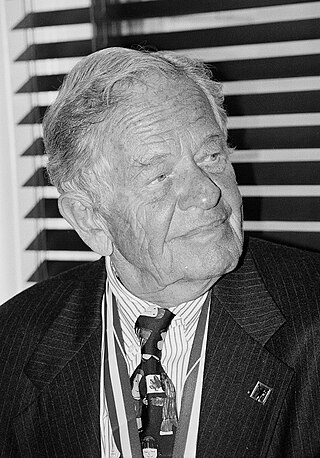
Thomas Berry Brazelton was an American pediatrician, author, and the developer of the Neonatal Behavioral Assessment Scale (NBAS). Brazelton hosted the cable television program What Every Baby Knows, and wrote a syndicated newspaper column. He wrote more than two hundred scholarly papers and twenty-four books.
Stanley Greenspan was an American child psychiatrist and clinical professor of Psychiatry, Behavioral Science, and Pediatrics at George Washington University Medical School. He was best known for developing the floortime approach for attempting to treat children with autistic spectrum disorders and developmental disabilities.
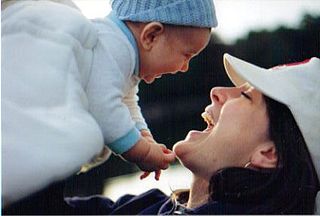
A maternal bond is the relationship between a biological mother/caregiver and her child or baby. While typically associated with pregnancy and childbirth, a maternal bond may also develop in cases later on in life where the child is unrelated, such as in the case of an adoptee or a case of blended family.
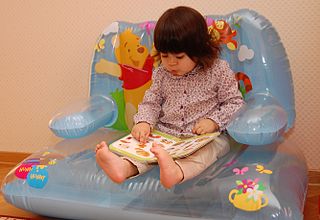
Vocabulary development is a process by which people acquire words. Babbling shifts towards meaningful speech as infants grow and produce their first words around the age of one year. In early word learning, infants build their vocabulary slowly. By the age of 18 months, infants can typically produce about 50 words and begin to make word combinations.

The Individuals with Disabilities Education Act (IDEA) is a piece of American legislation that ensures students with a disability are provided with a Free Appropriate Public Education (FAPE) that is tailored to their individual needs. IDEA was previously known as the Education for All Handicapped Children Act (EHA) from 1975 to 1990. In 1990, the United States Congress reauthorized EHA and changed the title to IDEA. Overall, the goal of IDEA is to provide children with disabilities the same opportunity for education as those students who do not have a disability.
Penelope Jane Leach is a British psychologist who researches and writes extensively on parenting issues from a child development perspective.
Baby videos are educational tool which can be used for teaching babies as young as six months by introducing the alphabet, different sights, shapes and colors, numbers and counting. Baby videos can be used for helping babies learn important educational skills, comprehension, introduction to the environment, as well as music. Some parents use baby videos to help develop their children's motor skills and open their young minds to the world. Certain preschools, educators and caregivers find baby videos to be a useful tool, but medical professionals have yet to determine whether or not baby videos are beneficial to children or not.
Sesame Beginnings is a line of products and a video series, spun off from the children's television series Sesame Street, featuring baby versions of the characters. The line is targeted towards infants and their parents, and products are designed to increase family interactivity.
Rachel Barr is a professor at Georgetown University. She is currently the co-director of graduate studies in the Department of Psychology at Georgetown University. Her research focuses on understanding the learning and memory mechanisms that develop during infancy. Because infants are preverbal, her techniques rely on imitation and learning methods to find out what infants have learned and how well and how long they remember it. Her previous research has focused on how infants pick up information from different media sources, television, siblings, adults, and different contexts. Most recently, Barr's studies focus on factors that might enhance infant learning from television.
Early childhood intervention (ECI) is a support and educational system for very young children who have been victims of, or who are at high risk for child abuse and/or neglect as well as children who have developmental delays or disabilities. Some states and regions have chosen to focus these services on children with developmental disabilities or delays, but Early Childhood Intervention is not limited to children with these disabilities.
Early Head Start is a federally funded community-based program for low-income families with pregnant women, infants, and toddlers up to age 3. It is a program that came out of Head Start. The program was designed in 1994 by an Advisory Committee on Services for Families with Infants and Toddlers formed by the Secretary of Health and Human Services. "In addition to providing or linking families with needed services—medical, mental health, nutrition, and education—Early Head Start can provide a place for children to experience consistent, nurturing relationships and stable, ongoing routines."
Infant mental health is the study of mental health as it applies to infants, toddlers, and their families. The field investigates optimal social and emotional development of infants and their families in the first three years of life. Cognitive development, and the development of motor skills may also be considered part of the infant mental health picture. While the interest in the mental life of infants in the context of their early relationships can be traced back to the work of Anna Freud, John Bowlby, and Donald Winnicott in Great Britain, infant mental health as a movement of public health policy, empirical research, and change in clinical practice paralleled both that of the women's movement and of increased awareness of the prevalence and consequences of child abuse and neglect during the 1960s and 1970s. The vast literature that has emerged since the field's origins has been reviewed in several key texts. Basic principles of infant mental health evaluation and treatment involve consideration of at least three patients: parent(s), child, and their relationship, while keeping in mind the rapid and formative development of the brain and mind in the first years of life.

Daniel S. Schechter is an American and Swiss psychiatrist known for his clinical work and research on intergenerational transmission or "communication" of violent trauma and related psychopathology involving parents and very young children. His published work in this area following the terrorist attacks on the World Trade Center in New York of September 11, 2001 led to a co-edited book entitled "September 11: Trauma and Human Bonds" (2003) and additional original articles with clinical psychologist Susan Coates that were translated into multiple languages and remain among the first accounts of 9/11 related loss and trauma described by mental health professionals who also experienced the attacks and their aftermath Schechter observed that separation anxiety among infants and young children who had either lost or feared loss of their caregivers triggered posttraumatic stress symptoms in the surviving caregivers. These observations validated his prior work on the adverse impact of family violence on the early parent-child relationship, formative social-emotional development and related attachment disturbances involving mutual dysregulation of emotion and arousal. This body of work on trauma and attachment has been cited by prominent authors in the attachment theory, psychological trauma, developmental psychobiology and neuroscience literatures
Toddler nutrition is the description of the dietary needs of toddlers aged one to two years old. Food provides the energy and nutrients that toddlers need to be healthy. An adequate intake in nutrient rich food is good nutrition. A diet lacking essential calories, minerals, fluid and vitamins could be considered 'bad' nutrition. Nutrition needs are different for toddlers. For a baby, breast milk is "best" and it has all the necessary vitamins and minerals. Toddlers typically have been weaned from breast milk and infant formula. Though infants usually start eating solid foods between 4 and 6 months of age, more and more solid foods are consumed by a growing toddler. If a food introduced one at a time, a potential allergen can be identified. Food provides the energy and nutrients that young children need to be healthy. Toddlers are learning to feed themselves and to eat new foods. They should eat a variety of foods from all the food groups. Each day, toddlers need enough nutrients, including
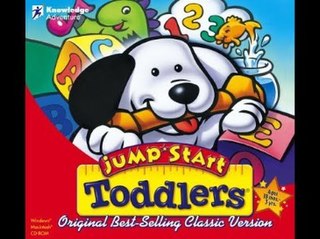
JumpStart Toddlers is a 1996 educational video game, the fourth within the JumpStart franchise. An enhanced version was released in 2000.









